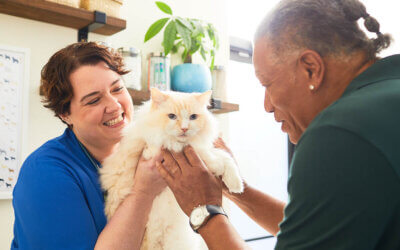 Compassion fatigue has had a center stage in our animal hospitals over the last decade. And, rightly so. The veterinary industry lands in the top five industries where compassion fatigue and suicide prevalence are on the radar. We are an industry of empathetic, caring individuals, who often may be giving from a place of void. It has been stated that “there is a cost of caring” from industry professionals—and there is. But it doesn’t have to translate into the loss of a resilient environment.
Compassion fatigue has had a center stage in our animal hospitals over the last decade. And, rightly so. The veterinary industry lands in the top five industries where compassion fatigue and suicide prevalence are on the radar. We are an industry of empathetic, caring individuals, who often may be giving from a place of void. It has been stated that “there is a cost of caring” from industry professionals—and there is. But it doesn’t have to translate into the loss of a resilient environment.
How can you continue to provide compassionate care, while minimizing stress and burnout? While we don’t have a prescriptive solution to prevent compassion fatigue, there are techniques we can easily implement to help. Our goal should be to create an environment of resilience without minimizing the level of care our clients have come to feel and expect. Here are six tips that can help.
1: Be aware
Let’s be honest. Days and interactions can get hectic. Our pet parents perhaps didn’t embody a level of consideration during the pandemic, and maybe some of those bad communication and interaction behaviors have persisted.
Are you supporting daily “check-up’s” of your team? How can you do this? Simple. ASK. Check in with your team. Ask them how they are feeling, even after challenging situations. Be aware and notice what may not be immediately obvious.
2: Help set boundaries
Coach your team on what boundaries can look, sound, and feel like. Perhaps it’s a reminder of active listening or even a reminder to not take negative interactions personally.
“Are you doing your best?” is a great question to help reset negativity. That’s all we can ask of our team, so if someone can answer “yes”, help them feel confident that they are supported by management and owners.
3: Reset
So many techniques can help reset our mindsets from negativity to realistic positivity.
Emotional freedom technique (EFT), Taking Five (a fast five-minute break outside or in a breakroom), and allowing team members to bring in pictures of positive, joyful experiences to hang in your breakroom are just a few examples. All of these can guide and help mentally reset negative experiences.
4: Offer professional support
Does your team know where to go for help, whether it’s social or professional support?
Employee Assistance Programs (EAP), Mentorship programs like MentorVet, or counseling services should be discussed and visible in your hospital. What resources can you and do you offer to provide support?
5: Empathize
Compassion fatigue affects everyone differently. You and I may experience this phenomenon on differing levels. A little empathy and understanding can go a long way. Be empathic, listen, and help create solutions through communication development and self-care.
Lilianna Hogan suggests becoming curious, focusing on similarities rather than differences, putting yourself in someone’s shoes, and listening while also sharing as effective strategies for building empathy toward others.
6: Teach resilience
This goes hand in hand with creating boundaries. By coaching on communication skills, professional skills, and teaching to be strong minded and kindhearted with our care, we can support our teams.
Train on concepts and techniques. For example, if a client uses the off-the-cuff comment of “Did I just pay for a wing at the hospital?” train and role play responses during your next team meeting. Teach your team to first think “What would I say if there are no repercussions?”, then coach and teach the right way to respond—clarify and connect: “I can go through your pet’s healthcare items today more clearly if you do have some concerns. One way I choose to look at my pet’s annual or semi-annual charges is like this…” or even dig deeper “I do want you to know we value your trust in our healthcare team for your pet. If there are some concerns, I’d happily listen and find some support.”
“If we don’t teach our teams to practice talking through situations, we risk them acting out in stressful moments.”
Consciously build a resilient environment
 Finally, help your team understand the benefits of self-care and professional development. Self-care remains the top recommendation for minimizing burnout, stress, and ultimately compassion fatigue. Exercise, sound nutrition, and concepts around journaling, vision boards, connection to hobbies outside of work are all key examples of self-care. Remembering what works for you may not work for another team member is important as well. Survey your team and ask what they would like to explore as a team, but also for individual outlets to relieve stress.
Finally, help your team understand the benefits of self-care and professional development. Self-care remains the top recommendation for minimizing burnout, stress, and ultimately compassion fatigue. Exercise, sound nutrition, and concepts around journaling, vision boards, connection to hobbies outside of work are all key examples of self-care. Remembering what works for you may not work for another team member is important as well. Survey your team and ask what they would like to explore as a team, but also for individual outlets to relieve stress.
There will always be emotional highs and lows in a veterinary career. The goal remains to keep balance and solutions top-of-mind for health care teams. Check-in often — with your team and yourself. Help create a resilient environment where teams can give from a place of abundance instead of scarcity.



